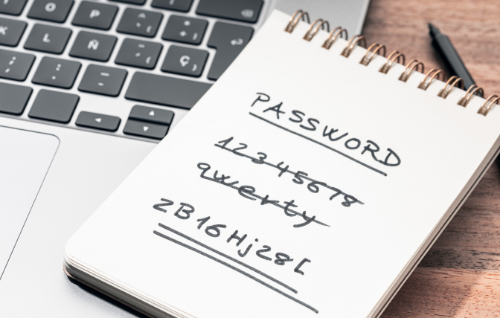Why weak passwords pose a security risk
Many cyber attacks do not begin with sophisticated technology, but with simple password attacks. In so-called brute force or dictionary attacks, attackers automatically test millions of password combinations – often with alarming success. Weak or reused passwords are an open gateway for this.
In a corporate context, this means that if a single account is compromised, entire networks can often be affected. Especially if central services such as mail servers, CRM systems, or VPN access are involved. The damage ranges from data loss to extortion (ransomware) to production downtime.
This is regardless of the size of the company. Attacks affect everyone, from one-man craft businesses to large banks and corporations. Only with the right precautions, tailored to the individual needs of the company, can security gaps be reduced.
What a secure password must be able to do today
A modern password should not only be long, but also complex and unique. Security authorities such as the Federal Office for Information Security (BSI) recommend:
At least 12 characters
A combination of upper- and lower-case letters, numbers, and special characters
No common terms or keyboard patterns
No reuse of passwords on multiple platforms
But this is precisely where the problem lies: the more services are used in a company, the more difficult it becomes for employees to remember secure passwords.

Password managers and MFA – how secure authentication works
The solution: technical support. Password managers generate and store complex passwords, thereby reducing the risk of reuse or notes under the keyboard. For companies, they also offer the option of defining access restrictions and managing passwords centrally.
Even more important, however, is the introduction of multi-factor authentication (MFA). This protects access not only with a password, but also with a second security component – such as a one-time code via app, a biometric procedure, or a physical security key such as the YubiKey.
YubiKey & Co. – physical keys for greater protection
YubiKeys are small USB or NFC devices that serve as a second factor during login. They are based on open standards such as FIDO2 or WebAuthn and are considered a particularly secure and phishing-proof solution for MFA. Unlike SMS codes or app-based authentication, they cannot be intercepted or forged.
Especially in the B2B environment, where sensitive data and critical infrastructures must be protected, YubiKeys offer additional security for access to cloud services, VPNs, remote desktops, or system administration.
Once set up, a quick tap on the device is all it takes to authorize access without long waiting times or tedious password typing. This makes hardware tokens such as YubiKey not only secure, but also convenient for everyday use.
Password policies in the company – what really helps
Technical measures alone are not enough. It is crucial that clear rules are in place within the company. These include:
Automatic locking after multiple failed attempts
Mandatory password changes at defined intervals
Training for employees on the secure handling of access data
Regular checks to see if passwords have appeared in leaks (e.g., via services such as HaveIBeenPwned)
Use of physical authentication devices such as YubiKeys in security-relevant areas
Modern hardware such as firewalls, gateways, or stateful inspection-capable routers
Guest or standard accounts, such as those on routers or firewalls, should also be deactivated or secured immediately—they are a popular target for automated attacks.
Access control: Who really needs access?
Another important element of cyber security is the “need-to-know” rule: not every employee needs access to every resource. Role-based access controls ensure that everyone only sees what they need to see for their work. This prevents a single compromised account from escalating into a large-scale attack.
Access rights should be reviewed and adjusted regularly. Especially for employees who leave the company or change departments internally, access rights should be removed or adjusted accordingly.
Depending on the size of the company, centrally managed password managers such as Keepass or Dashlane are also useful for identifying security gaps at an early stage or avoiding the infamous physical notes with passwords.
IT security starts at the grassroots level – with the right partners
Secure passwords and access controls are an essential part of any IT security strategy, but they are not enough on their own and are only one component. A strong security concept includes firewalls, network monitoring, encryption, and regular audits.
At IT-Market.com, you will not only find refurbished hardware for your network security, but also expert advice for your individual security architecture. Whether YubiKeys, routers with VPN functionality, firewall systems, or security gateways – we help you effectively protect your company from cyber threats.
Do you need assistance in selecting the right security solutions or would you like to improve your existing network security? Then our team of experts is happy to assist you.
